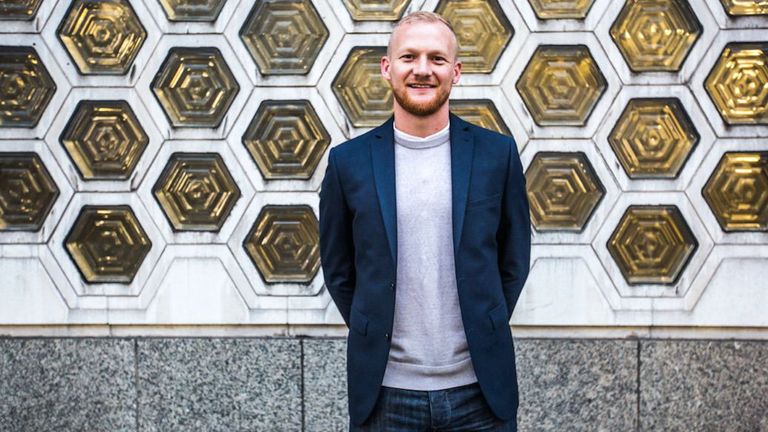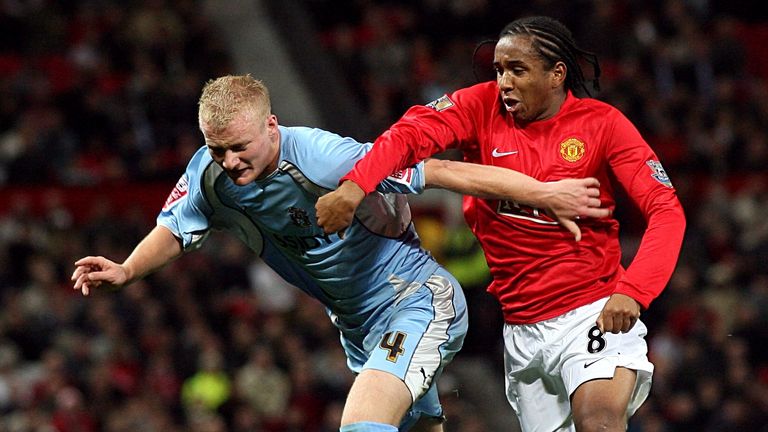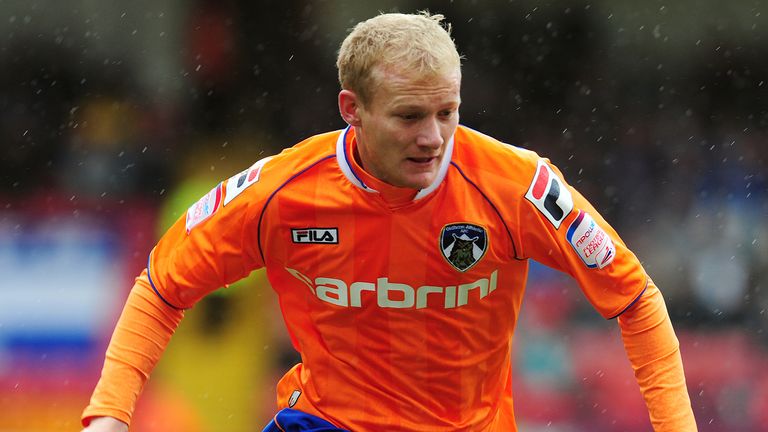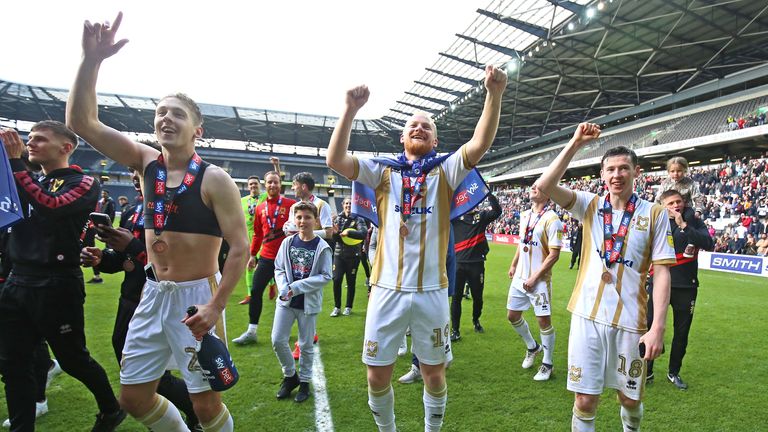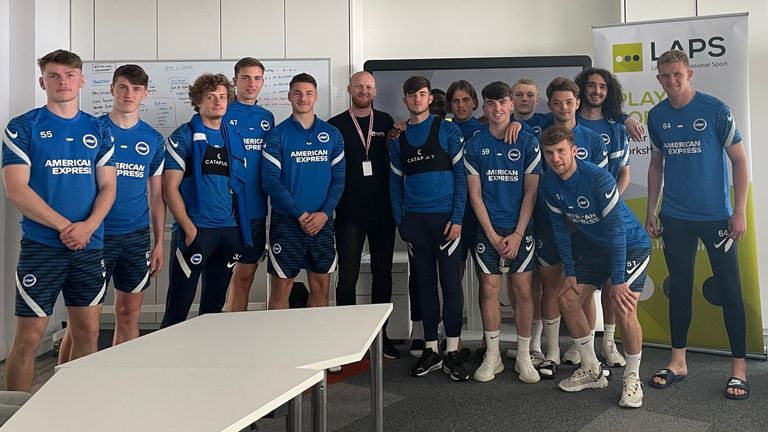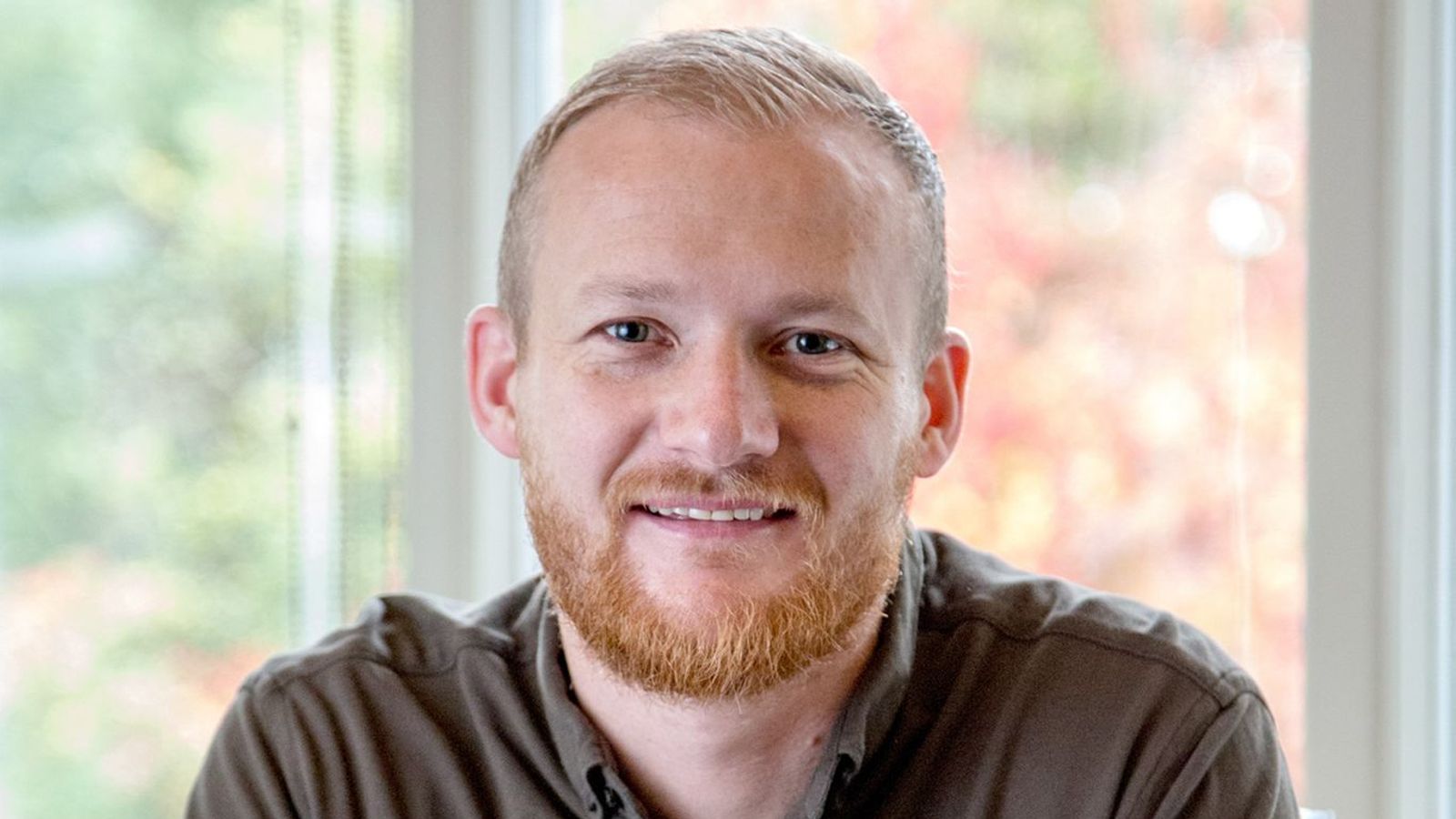
On the face of it, Robbie Simpson’s route into professional football meant that he was always going to be well-placed to make a smooth transition away from the pitch once the dream finally came to an end.
After he had played for non-League Cambridge City as a teenager, he studied for a degree in Sports Science and Maths at Loughborough University and in July 2007 – the same month as his graduation – signed for Championship side Coventry from Cambridge United.
And it was on the very first day of pre-season training that a seed, which could very well shape the rest of his life, was planted.
“I remember overhearing Stephen Hughes and Arjan de Zeeuw saying it could be their last season and wondering what they were going to do after football – and I sensed a bit of a worried tone,” the 37-year-old recalls to Sky Sports.
“I was thinking ‘You [Hughes] played for Arsenal – you must be a millionaire and not have to worry about having to work again!’
“As people got to know me, I got labelled the student as I was the only one with any form of education in the changing room. They were coming to me about courses and education and almost looking at me with a bit of jealousy because they thought I’d be fine when I finished playing as I had a degree. It was surreal.”
Simpson moved on to Huddersfield after two years with the Sky Blues, but struggled for playing time there and later spent 18 months at Oldham in League One, following a season-long loan spell at Brentford.
It was at Boundary Park, in the summer of 2013, that he found himself at a crossroads.
“I had been desperate to get back and I had always regretted dropping into League One after leaving Coventry and signing for Huddersfield,” he admits. “I thought it was going to be my last chance to get back to the Championship that summer.
“I went trialling with Championship clubs all summer and even into the season I was at Blackburn and then Sheffield Wednesday, but nothing came about. During that period, I was turning down offers from League One and League Two clubs and it got to the point where nothing had come from Doncaster or Blackburn and Sheffield Wednesday were the one club to say no. I was stuck then.
“By that time, it was near enough November and though I felt like I’d been good with my money – I’d invested a lot and saved a lot – I could see that coming down because I was still living the same lifestyle on no income for four or five months.
“The offers from League One and Two clubs had then gone as they had signed someone else when I had turned them down, so I was in a bit of a hole. I really wasn’t dealing with it well because I didn’t know what I wanted to do beyond football – I hadn’t even thought about it because I didn’t think I was going to have to think about it until I was in my mid-30s.
“I didn’t feel like there was any support in that regard from anybody either, whether that be clubs, my player union or the PFA.”
He did not particularly fancy a coaching career – particularly after being told one year there were 2,000 candidates completing their badges and around 200 roles on offer – and with a degree under his belt already, a sports journalism course did not whet his appetite either.
That is when LAPS (Life After Professional Sport) was created.
“A few friends said I needed to get a LinkedIn profile, so I did and I started connecting with literally anybody,” Simpson says with a laugh.
“I connected with Rob Steed (CEO of LAPS) – and we met around six months later when I re-signed for Cambridge in 2014. He asked me if I knew how he could get to sportspeople as he was a recruitment consultant for four or five different companies and they had asked him to recruit sportspeople into their businesses. I wondered why.
“He started listing off all these different attributes top-level sportspeople have: they are driven, they are determined, they’ve got grit, they are good goal-setters, they learn from failure quickly, they analyse their own performance really well and he just kept going on. He was absolutely right. Just to become a professional sports person, at some point along the line, you would have to show all of these attributes, or at least a large amount of them.
“That ignited something in me that I knew there was a need for more support from the sportsperson’s perspective, in terms of the end of their career and what they are going to go into. I didn’t know there was a need from companies’ perspectives to get an in into this niche market of sports people. It was like a match made in heaven.
“Originally we were going to set LAPS up as a job board where he would go out and find companies to place their jobs or opportunities for sports people on an online platform. I would then advertise the online platform to sports professionals and it would be a platform for them to log onto, and apply if they saw something they liked.
“We soon realised that wasn’t going to be enough. I hadn’t written a CV since I had left university, so these lads wouldn’t have done it since they were 16. I had a degree behind me, but 99 per cent of footballers didn’t, so we needed to do CV writing. None of them would have ever gone to a job interview before, so we had to create a page to help them with interview techniques.
“The hardest thing would be making the sports people realise that the earlier they plan, the easier it will be at the end.”
The pair make it clear to members that they have anything up to 60 more years in which to sustain themselves and their families, but that they will do everything they can to find something to suit their needs.
On the LAPS website laps.careers, there is a section dedicated to video interviews with former sportspeople “who have successfully transitioned into new and rewarding careers”, while the Ahead of the Game networking event – often held at large football stadiums like the Etihad – provides a plethora of potential opportunities for athletes all around the country
Their tireless work has even caught the attention of the Premier League and League Football Education who requested a workshop that could be delivered to U18 and U23 teams and paid for by a portion of their annual education budgets.
The response can be mixed, but Simpson does not mind. “I always say that I don’t care if we don’t hit 99 per cent of the athletes we are speaking to, because that one per cent matters and that one per cent makes it all worthwhile.”
There is one particular success story that sticks in his mind.
“As soon as I set up LAPS, I told my team-mates about it down at Exeter and there was a lad called Tom McCready who got released at the end of the 2016/17 season and was struggling to get a new club,” he says.
“He knew I had just set up LAPS and he reached out to me. We do members meet-ups, where one of our partners hosts it in their offices, and we got St James’ Place, the wealth management company, to host it. I told Tom we had an open day and that he should come along – instantly he hit it off.
“He listened to what St James’ Place had to say about why they wanted sports people in particular and what the career could look like. He called me the next day and said he’d had a think, that it was something he wanted to explore and whether I could put him in touch with them.
“We guided him through the process of getting into their academy and now he has been with them for nearly five years.”
There is an ambition to join forces with the PFA to maximise the impact of services to help players hanging up their boots, but so far no progress has been made on that front.
Simpson explains: “When I first set up LAPS and took it to the PFA, I thought they were going to be really supportive, because I designed it for all of the different player unions and bodies to use themselves.
“They were – and still are – a bit dismissive of it and they would just say they had their own recruitment page – and I knew all about that! It has been tough with the PFA, it really has.
“Without their help we’ve still done it, but it’s disappointing because together, I feel that we can achieve so much more. Hopefully we’ll get there one day – we’ll keep trying, that’s for sure.”
In the meantime, he has made inroads to tackle another aspect of life off the pitch that doesn’t receive attention; LAPS was formed to tackle the transition from sports person to ordinary member of the public, with a second company – RS19 – formed to help with lifestyle financial planning.
Most notably in football, players are handed vast sums of money at a young age, often with no real idea how to handle it. They build a lifestyle that they have the funds to finance at the time, but a football career is a short one and, most of the time, the money will not last forever.
He is there to offer a sensible voice and a helping hand – but, crucially, the last thing he wants to do is impose lifestyle restrictions upon clients.
“No one likes to talk about money, especially footballers where if you’re seen to be wanting to move for more money, you’re seen to be a bad, greedy person. There’s a bit of a stigma there,” he says.
“Sportspeople do get paid well for something they love doing, which we all aspire to do. It’s through no fault of their own, but there is a lifestyle demand of a footballer and it takes a really strong person to not give into those lifestyle demands.
“The first meeting I’ll have with a client is just a coffee to see if we get on and whether we could establish trust – I believe that long-term friendship helps to achieve the best results. I work quite holistically, so I like to get an overview of their whole picture i.e. their family, their lifestyle, their current savings, their investments, their pension provisions.
“I call it a life plan, so we look at short-term, medium-term and long-term. We gauge what they want to do and then come up with a plan and I educate them on different financial investment products they could utilise.
“I don’t like doing it to limit the lifestyle they want to live now because they I feel like it’s a burden on them and every time they invest money, it’s restrictive. Every six months I’ll sit down with them, especially with footballers, because their income can change just like that. The key, for me, to being a good long-term financial planner is being adaptable to clients’ situations.”
The two businesses that keep Simpson involved in professional football continue to grow and offer the footballers of today the support and guidance he found to be absent earlier during the fledging years of his professional career.
He admits helping others has changed him personally for the better, and that the whole ethos of both LAPS and RS19 has developed into something much bigger, too: tackling mental health issues in sport.
“It has really ignited a passion within me for helping people,” he adds.
“As a footballer, people think you are selfish; setting up LAPS made me become less selfish. In fact, the last three years of my career, where I was running LAPS alongside playing, I felt that I became a better player because I was more unselfish.
“I can remember watching Jordan Rhodes on the bench every week at Huddersfield hoping that he would fail to benefit me. It’s ridiculous because Jordan Rhodes is one of the nicest people I have ever met! I look back at myself back then and I wasn’t a good person. If you compare the beginning of my career to the end, I feel you can really see how much I’ve grown.
“One aspect of mental health in sportspeople is coming to terms with their career coming to an end one day. Without a shadow of a doubt, that plays on sports people’s minds. Whether they earned a lot of money or not, they are not going to get that feeling of walking out onto a pitch or scoring a goal again.
“We feel that, rather than them having mental health issues and then talking about them, we hope that LAPS can help provide interests away from sport alongside their sporting career so maybe they don’t have to talk at the end, maybe those mental health issues don’t grow and grow and then when the career ends, explode.
“In anything, you have to get buy-in from the player. I need to help them understand why these two companies are beneficial for them and get buy-in from them for them to be able to utilise them properly.”
The word of the guidance he and his companies can offer is gradually filtering into dressing rooms, and players should take comfort in that.
After all, he is, in fact, living proof that there is indeed life after professional sport.

